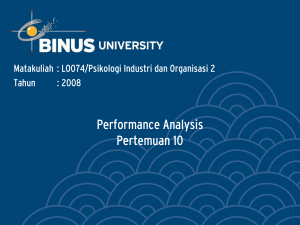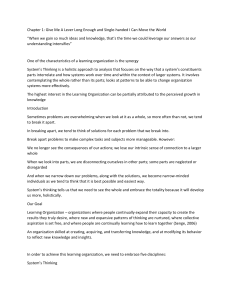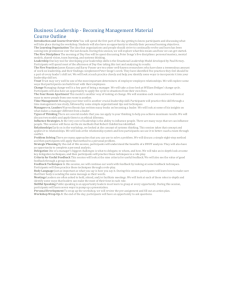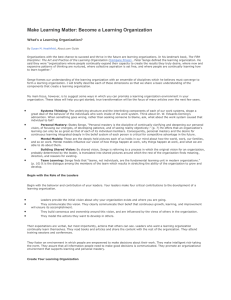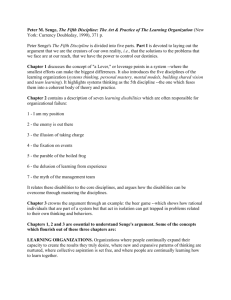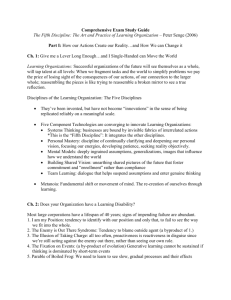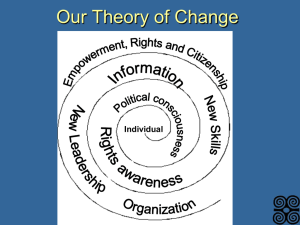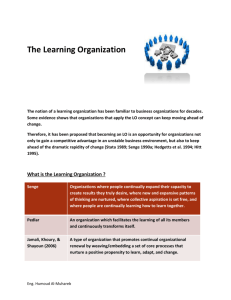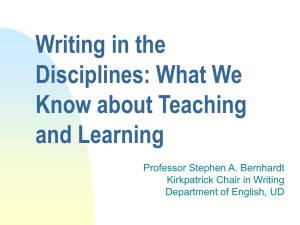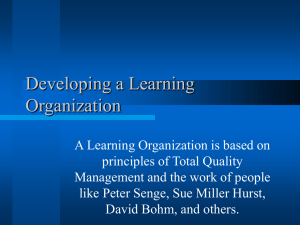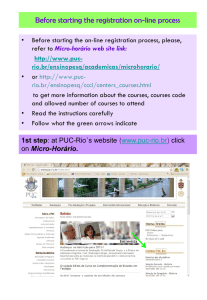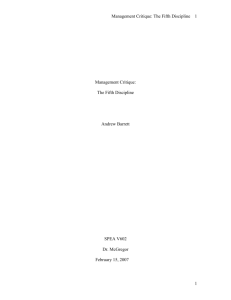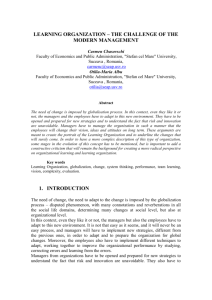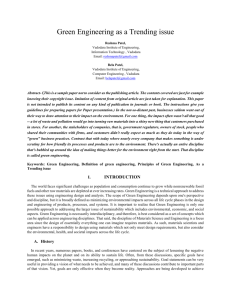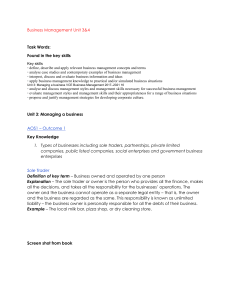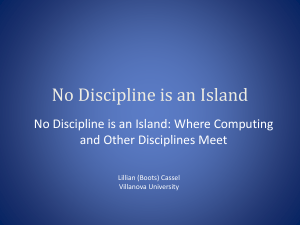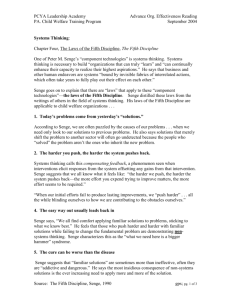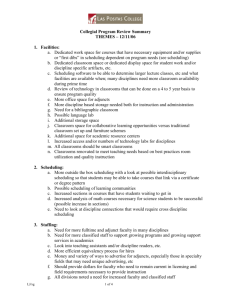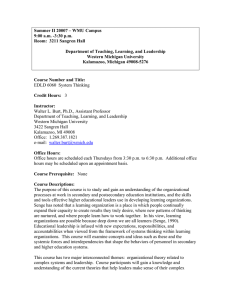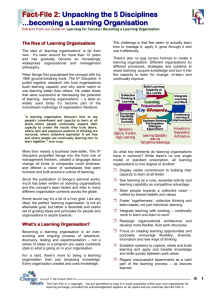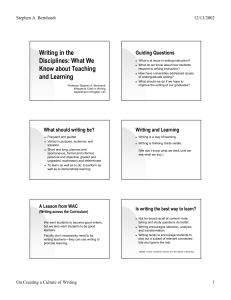The Five Disciplines Peter Senge The Fifth Discipline: The Art and
advertisement
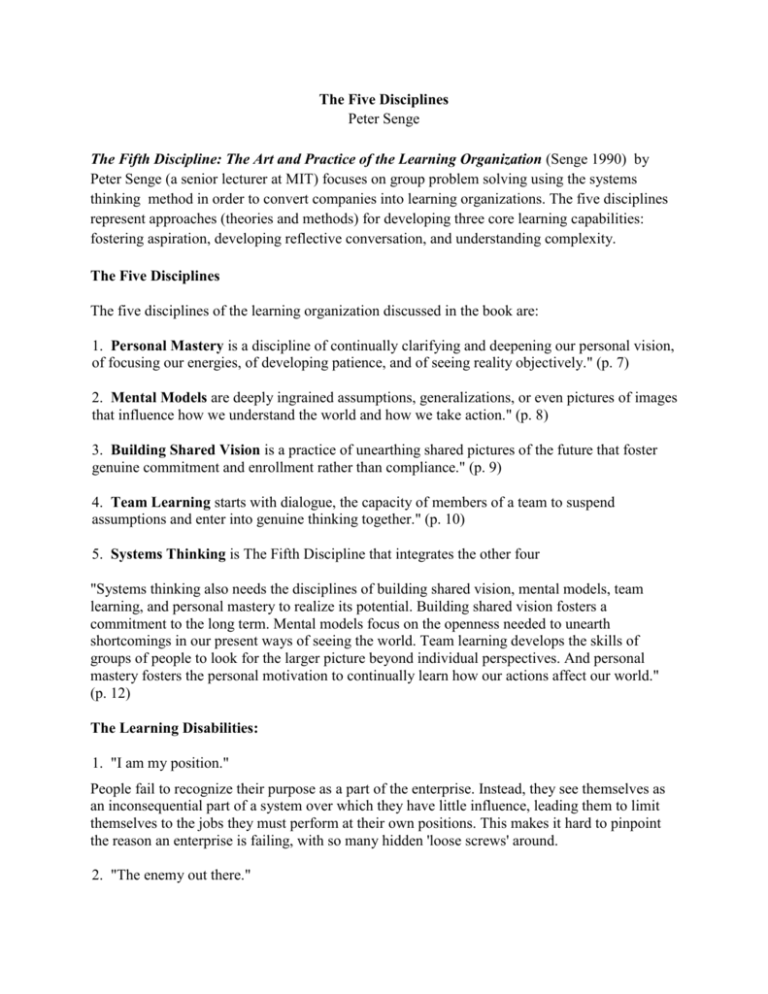
The Five Disciplines Peter Senge The Fifth Discipline: The Art and Practice of the Learning Organization (Senge 1990) by Peter Senge (a senior lecturer at MIT) focuses on group problem solving using the systems thinking method in order to convert companies into learning organizations. The five disciplines represent approaches (theories and methods) for developing three core learning capabilities: fostering aspiration, developing reflective conversation, and understanding complexity. The Five Disciplines The five disciplines of the learning organization discussed in the book are: 1. Personal Mastery is a discipline of continually clarifying and deepening our personal vision, of focusing our energies, of developing patience, and of seeing reality objectively." (p. 7) 2. Mental Models are deeply ingrained assumptions, generalizations, or even pictures of images that influence how we understand the world and how we take action." (p. 8) 3. Building Shared Vision is a practice of unearthing shared pictures of the future that foster genuine commitment and enrollment rather than compliance." (p. 9) 4. Team Learning starts with dialogue, the capacity of members of a team to suspend assumptions and enter into genuine thinking together." (p. 10) 5. Systems Thinking is The Fifth Discipline that integrates the other four "Systems thinking also needs the disciplines of building shared vision, mental models, team learning, and personal mastery to realize its potential. Building shared vision fosters a commitment to the long term. Mental models focus on the openness needed to unearth shortcomings in our present ways of seeing the world. Team learning develops the skills of groups of people to look for the larger picture beyond individual perspectives. And personal mastery fosters the personal motivation to continually learn how our actions affect our world." (p. 12) The Learning Disabilities: 1. "I am my position." People fail to recognize their purpose as a part of the enterprise. Instead, they see themselves as an inconsequential part of a system over which they have little influence, leading them to limit themselves to the jobs they must perform at their own positions. This makes it hard to pinpoint the reason an enterprise is failing, with so many hidden 'loose screws' around. 2. "The enemy out there." 3. The Illusion of Taking Charge 4. The Fixation of Events The tendency to see things as results of short-term events undermines our ability to see things on a grander scale. Cave men needed to react to events quickly for survival. However, the biggest threats we face nowadays are rarely sudden events, but slow, gradual processes, such as environmental changes. 5. The Parable of the Boiling Frog 6. The Delusion of Learning from Experience 7. The Myth of the Management Team The 11 Laws of the Fifth Discipline 1. Today's problems come from yesterday's "solutions." 2. The harder you push, the harder the system pushes back. 3. Behavior grows better before it grows worse. 4. The easy way out usually leads back in. 5. The cure can be worse than the disease. 6. Faster is slower. 7. Cause and effect are not closely related in time and space. 8. Small changes can produce big results...but the areas of highest leverage are often the least obvious. 9. You can have your cake and eat it too---but not all at once. 10. Dividing an elephant in half does not produce two small elephants. 11. There is no blame. The Leader’s New Work: Centers on leader as designer (willingness to experiment, to break the mold, to allow others to evolve and provide input); teacher (invite others into space created for learning and be a servant); and steward (serve a larger purpose, focus on what needs to be conserved as well as changed, keeping initial purpose in mind). New leaders will emerge from among marginalized. The Learning Organization: “…organizations where people continually expand their capacity to create the results they truly desire, where new and expansive patterns of thinking are nurtured, where collective aspiration is set free, and where people are continually learning to see the whole together” (Senge)
